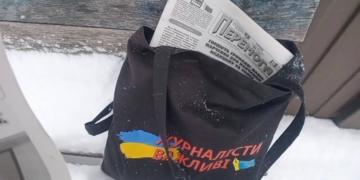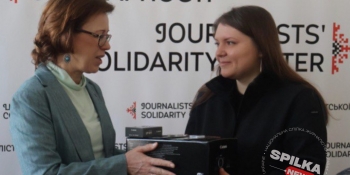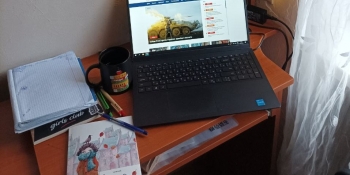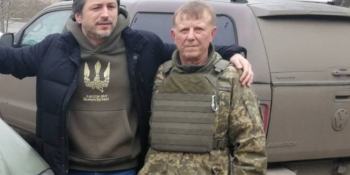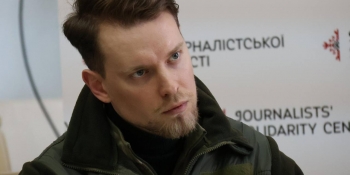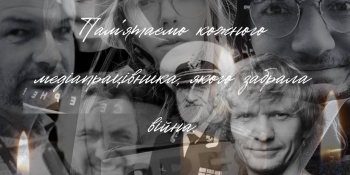Currently, in the conditions of Russian aggression against Ukraine, all Ukrainian media workers need the support of foreign colleagues and international organizations of journalist. Especially, this concerns those journalists who lost their jobs because of the enemy occupation of their cities and towns, as well as media workers who directly cover war events straight from the front lines.
This was discussed today at the conference of the International Federation of Journalists dedicated to the observance of labor rights and the transformation of workplaces of media workers and mass media editorial offices in Eastern Europe. Sergiy Tomilenko, the President of the National Union of Journalists of Ukraine (NUJU) and Lina Kushch, the First Secretary of the National Union of Journalists, took part in the conference.
As noted by Jeremy Dear, a Deputy Secretary General of the International Federation of Journalists, the digitalization of the economy creates new challenges for mass media. It is important that, under these conditions, jobs for media representatives are preserved as much as possible, and their labor rights are fully respected. At the same time, today’s issues of journalists are not limited to these ones. This became especially evident with the beginning of the Russian armed aggression against Ukraine.

Jeremy Dear thanked the NUJU for the work it is doing to support journalistic activity of both Ukrainian and foreign media workers in this country.
“Today, all Ukrainians are in danger, no matter in which region of the country they are. Yes, a month ago, a Russian rocket exploded 700 meters from the central office of the NUJU. In addition, the shelling destroyed the office of the Kharkiv regional organization of our union. Unfortunately, many journalists had to leave Kharkiv and the Kharkiv Region, as well as other war-torn regions of Ukraine,” said Sergiy Tomilenko.
According to Sergiy Tomilenko, large groups of journalists and media companies are victims of the current unjust war. In particular, these are colleagues who are escaping from the territories temporarily occupied by Russia and those trying to leave both for safer places in Ukraine and abroad. In addition, some journalists work or have worked directly in the conflict zone. Some journalists and media workers were injured during the attempted occupation of the Kyiv Region from February to March 2022. All these groups of media workers need particular attention.

“But in general, today, we are forced to say that all journalists working in Ukraine need support: the war destroys the economic foundations of mass media activity, logistical ways of delivering print publications to readers, etc., so we are all now rebuilding our activities. To date, 43 media workers have been killed in Ukraine as a result of Russia’s aggression. Among them, eight people were killed while performing professional duties. Others became civilian victims of the invaders or were killed being mobilized to the army,” said the President of the NUJU.
Sergiy Tomilenko also added that no independent journalistic activity is possible in the occupied territories: media workers are forced either to become Russian propagandists or to remain silent.
“We are grateful for the support of the International Federation of Journalists, the European Federation of Journalists, UNESCO, and other authoritative organizations that help us in our work. In particular, with the support of the EFJ, we deployed a whole network of Journalist Solidarity Centers. Currently, it works in six cities and allows to quickly provide courier assistance to Ukrainian journalists,” said Sergiy Tomilenko.
The President of the NUJU also reminded that the Ukrainian community of journalists is protesting against the creation of branches of the russian union of journalists in the occupied Ukrainian territories and calls for the exclusion of that union from the International Federation of Journalists.
Jeremy Dear emphasized, responding to Sergiy Tomilenko’s speech, Ukraine’s international partners will support Ukrainian journalists until Ukrainians live in free and safe conditions.
UNESCO is the United Nations Educational, Scientific and Cultural Organization. It contributes to peace and security by promoting international cooperation in education, sciences, culture, communication and information. UNESCO promotes knowledge sharing and the free flow of ideas to accelerate mutual understanding. It is the coordinator of the UN Plan of Action on the Safety of Journalists and the Issue of Impunity , which aims to create a free and safe environment for journalists and media workers, thus strengthening peace, democracy and sustainable development worldwide. UNESCO is working closely with its partner organizations in Ukraine to provide support to journalists on the ground.





